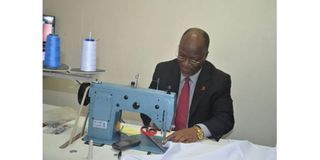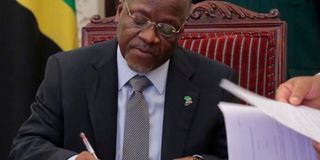Magufuli came into office with an ‘angry script’ he wrote, rewrote

The late President Magufuli uses sewing machine. Photo |File
This is one of those situations where the future is brought forward to the present!
I had thought of writing this article after the late Dr John Pombe Joseph Magufuli was due to complete second term as president in 2025…ceteris paribus. That is, if he would have completed his presidency and I am also alive!
I will explain, but as we all know by now, that will no longer be the case.
But before that, a disclaimer is in order. This is necessitated by the fact that our society is increasingly becoming intolerant, that one who wants everyone to agree with their school of thought risks being labelled, judged, pointed a finger at, or being branded being “either with us or against us”.
The danger with that is we are killing intellectual debates, discussions, thought-provoking minds, and discouraging individual and institutional thinkers alike. There is beauty in diversity and diverse points of view, among others.
Thus, the purpose of this article is not, in any way, aimed at portraying any point of view as victorious against the other or defeated. Rather, getting to know why things happened the way they did, while picking up some lessons on the power of purpose, and indeed, the power of dedication to purpose!
Now, let me explain why I had planned to write this in 2025, God willing. The reason this was to be told was a realisation that even as JPM was already serving his second term in office, one would argue that many still never understood him, where he was coming from, and most importantly, how to cope with him.
One of my long time friends, mentor and leader once told me that he was still getting questions from the international community and locals alike, suggesting that many were still struggling to get into JPM’s good books for their things to move forward as they desired. Any lobbyist would like to know how to grab the attention of a leader so as to influence his or her agenda.
It is at that moment, in a discussion with my friend, I jotted down the idea, telling myself it would be interesting to do a piece on a leader many failed to understand where he was coming from, and gauge his achievements against his unorthodox approaches.
So, I had hoped to keep the idea long enough to 2025, but here I am. I had to do it now!
John Pombe Joseph Magufuli ascended to the highest office in the land as an ‘angry’ person.
He came to power with an angry script he had written and rewritten over many years!
He entered the Magogoni State House in Dar es Salaam an angry man for what he had seen over the years while serving as deputy and later full minister for 20 years!
He was angry for the ‘slow pace’ he came across in the name of mchakato among civil servants.
He was angry because he believed Tanzania had been robbed of its potential, natural resources and wealth for years!
Magufuli came in angry because he strongly believed that the West and multinationals had reduced Tanzania, and indeed Africa as a whole, into a source of ‘raw materials’ on the one hand, and a market for finished products on the other.
He came in angry because Africa continued to ‘beg’ for help from abroad while sitting on vast arable land, countless natural resources and a huge intra-continental market both by size and population.
To him, this was war, and it was very personal!
A few of his quotes in various public rallies drive the point home: “Tumechezewa siku nyingi. Sasa basii!!” ….“Tanzania siyo masikini. Tanzania ni tajiri”…. “Tulikuwa shamba la bibi.”
And he knew he was to create lots of enemies, at times telling crowds, “Sitishwi wala sitishiki!”
As he started taking austerity measures, prompting the hashtag #WhatWouldMagufuliDo, he disoriented the opposition as he championed an anti-corruption agenda, which was seen to be a major tool used by the opposition to challenge any administration in power, Africa was fascinated with his leadership approach in his early days in office.

He didn’t waste much time before he trained his guns on the mining sector, prompting a protracted battle with multinationals in the industry – a battle that would determine whether he was going to win the war he had started, and get what was right for Africa, and Tanzania in particular.
In November 2016, Magufuli announced plans to further tighten controls in the sector to ensure that Tanzania maximised its benefits from its abundant natural resources.
Three committees would be formed to review the sector, two by the President himself and one by Parliament. The committees’ reports would later transform the way Tanzania related to then (current) and future investors in the sector.
In March 2017, JPM called for the construction of smelters in the country, and barred the export of gold/copper concentrates in what is known as the makinikia saga.
According to the Tanzania Minerals Audit Agency findings of 2011, with a viable smelting project, the country should be able to produce 120,000 tonnes a year. At that point, Tanzania was exporting about 60,000 tonnes a year. (Note: in 2008, the Judge Bomani Commission – which reviewed the mining sector – made recommendations, which included the need to develop internal capacity to process and refine raw minerals in the country).
Little ground had been covered on the same when JPM took over.
Thus, the banning of concentrate exports and the argument that this process can only be done abroad – because smelters don’t come cheap – takes us to perhaps one of the early traces of what has always been in his mind – his anger and the script he had been writing and editing over the years.
In an undated video clip doing the rounds on social media, Magufuli is seen discussing animatedly with some colleagues why Tanzania wasn’t able to process its concentrates locally, and had to ship them to Japan. His knowledge of chemistry was clear.
He is heard explaining the process of extracting silver, titanium and copper. “All you need is heat it to a temperature of 1,500 degrees centigrade, the boiling point which can separate them.”
“Can’t we do just that?” he asks, and the answer is, “Yes, we can!” He adds, “So why can’t we invest in (a smelter)?”

President John Magufuli swears in Mr James Kaji as the new director general of the Drug Control and Enforcement Authority (DCEA) at the Chamwino State House in Dodoma yesterday. In a surprise move, Dr Magufuli confirmed Mr Kaji, who was acting in the position, during the swearing-in of a newly-appointed regional commissioner and a regional administrative secretary. PHOTO | STATE HOUSE
In what seemed to be a response to a perceived hopeless situation, he goes on (in a typical JPM tone), “Ila tuibiwe tu hivyo hivyo mpaka siku ya kufa.” He pauses as he is interrupted by one of his closest friends, (who he later appointed minister for Home Affairs before he unceremoniously relieved him of his duties just five months later for misconduct), “So if you believe we can do that, why don’t you pick up (candidacy) forms and run for the top office?”
His response: “Mimi watalimia meno!” Literally meaning, they will plough using their teeth (not hoes)!
So, back to makinikia. It wasn’t surprising when he declared war on the mining sector. And, as the mining contract reviews battle raged on, I took time to analyse why he had decided to take the bull by the horns, and what it meant if he succeeded or failed.
In an article titled Agony of a raw deal: JPM into anti-Trump deal-making style? (Is Magufuli in crusade against Trump-like negotiating game?), published by The Citizen on April 12, 2017, I related his approach to someone who had understood the way Trump the billionaire and later on as the 45th President of the US applied his eleven rules of negotiation principles from his book The Art of the Deal.
Just like Trump and most successful businessmen, multinationals are known for perfecting the art of “selling high”… blindfolding the would-be sellers into reducing themselves to nothing, while at the same time making them feel like they are being treated to a huge favour, with praises of being very important person(s) or company or nation for that matter so that when they are hit, they wouldn’t know what hit them.
In the end, such negotiations tactics leave the seller with a raw deal. The article looked at tactics “sellers” like Tanzania with their abundance of natural resources needed to adopt to control and attain an equal voice on the table when selling to top ‘CEOs and multinationals’.

However, it is not an easy task at all! It calls for some serious thought before one gets an opportunity to sit down and discuss business as equals.
I remember concluding my article hoping (then) that at the end of the day when the three reports (mining committees) are ready, the government would have gained the ability to go back to the re-negotiation table(s) with a strong proposition.
“Once that happens,” I went on, “President Magufuli’s stance to challenge the Trump doctrine applied by multinationals will shape our future approach in cutting deals. Yes, facing CEOs as equals!”
Four years down the road, he is gone, but he did win that crucial battle. A new law was put in place to review mining contracts. At least 26 contracts have been reviewed so far. The government – through joint venture arrangements – now holds at least 16 per cent stakes in two newly formed companies, namely Twiga Minerals Corporation and Tembo Nickel Corporation.
A multi-metal refinery facility (smelter) is in the offing under Tembo Nickel Corporation. It will make Tanzania a regional processing hub in East and Central Africa. Mineral trading centres have been established in key regions and districts.
According to Doto Biteko, Minister of Minerals, the government has established 40 mineral trading centres as well as 40 buying centres so far. A 24-kilometre Mirerani perimeter wall saw tanzanite revenues rise from Sh166 million ($74,439) in January 2015 to Sh1.28 billion ($460,987) in September 2018.
These interventions, and many similar ones, make Tanzania follow in Botswana’s footsteps, which ensured it had a stake in its minerals from the word go.
Being in government, and leading the Works ministry responsible for infrastructure development for years, he could see delays of projects as most of them depended on development budgets.
Over the years, Tanzania’s budget had substantially depended on development partners’ support. Development partners played a key role in determining the success of key development projects.
The unfortunate part was, at times donors either delayed or honoured just part of their pledges by the end of a given financial year. What that meant was slow progress in execution and completion of key/strategic projects.
Quietly, Magufuli was adding a paragraph or two to his script.
Come November 2015, he set out to mobilise resources locally to finance and meet project deadlines as planned, including reviving the national carrier, ATCL! He avoided foreign dependence as he considered it the main cause of most delays.
And in what appears to qualify that, a local analyst Andrew Bomani put it to me earlier this week, and I quote: “This is definitely for the records: throughout Magufuli’s reign, he NEVER set foot outside Africa. He equally just made a handful of trips in east and southern Africa. The reason is not clear though we did hear he had a heart condition. One of his flimsy reasons was that people would loot if he left…it was a big contradiction in leadership as JK (Jakaya Kikwete) told us that (foreign) trips bring in much-needed assistance, but this one said the contrary, and that we (Tanzania) should be a donor country instead. That was JPM!”
From austerity measures ranging from cutting down on foreign trips and allowances, pay cuts to tightening the noose on tax evaders and putting in place a comprehensive government electronic payments system, where all government payments had to be done through control numbers thus minimising physical contact between civil servants and service seekers (you know what that means), one gets to appreciate how his stay in government for 20 years as minister exposed him to some of the loopholes he vowed to seal.
He took it as a personal crusade to the extent that he would consider any challenge as a move to derail him from his agenda, hence the nickname ‘bulldozer’.
And the perceived disruption will range from wishing to ‘shut down the internet for a while for the world not to know what we are doing, and by the time it’s back we will have surprised them on the achievements we would have made’.
Literally, looking at it, it’s unthinkable to think that way, let alone do it. But looking at it contextually, one gets a feeling of what was occupying his mind.
Here was a president who, at last, had the final say in the country. And he had a map of the country he wanted in his mind, call it vision. He knew he had a lot to do to make it happen, and wanted to accomplish all of these in the shortest time possible. He was in a hurry to make his dreams come true.
To the bulldozer there will be a lot of collateral damage. There will be a lot of ‘occupational hazards’. There will be a lot of “in the line of duty” situations. He will step on many toes. And there will be mistakes. There will be pain – lots of pain. He will make people remember how he made them feel. Yet, there will be joy, a sense of liberation, enthusiasm, drive, and self-belief on the other side of the equation.
It is clear he knew he was fighting a big war (alone at times) with the West and at the domestic front as well. By taking the bull by the horns, he was making a huge statement – claiming an equal voice at the negotiation table.
And he knew he had stepped on many toes as he said this on various occasions. “They will never like me… I am sacrificing my life for this country.”
And the tone and body language whenever he talked of plunder of Africa was as emotional as it can be — a clear demonstration of his burning anger at what was not working.
By religiously pinning a small badge of Africa – not Tanzania – on his jacket, he demonstrated his love for the continent. Given an opportunity, it would have been interesting to ask why he always had that badge on his jacket. (I guess listening to African leaders at the state funeral in Dodoma on Monday on how he pushed them to believe that Africa is capable of defining its destiny speaks volumes of what occupied his mind).

Much as I may have differed with some of his approaches, I never doubted his sense of direction and motivation to achieve what he set out to do. Some of his “how to do” definitely left a lot of ‘collateral damage and pain’. Did he make mistakes? Ooh yes!
While to some he will go down as a truly visionary leader dedicated to his cause, to some, understandably so, his passing has been more on his “how to”... the way he executed his duties, than what he lived for… his purpose to life.
One thing is for sure. History will remember Magufuli as someone who came to this world with a purpose... a purpose he held so dear that it became personal. A purpose he held so dear it turned into raging anger over the plunder of Africa.
As Prof PLO Lumumba once said, “There is no future without selective memories, but we must not forget.”
Such level of hunger for change, anger at inequalities and dedication to purpose will always outlive any form of selective amnesia as far as continental liberalisation is concerned.
________________________________________________________________
Mr Machumu is the Acting Managing Director and Executive Editor of Mwananchi Communications Ltd, a multimedia company publishing Mwananchi, The Citizen and Mwanaspoti newspapers and digital outlets, among others, MwananchiDigital and MwananchiSCOOP – an online magazine. Twitter: @bmachumu; LinkedIn: Bakari S Machumu




